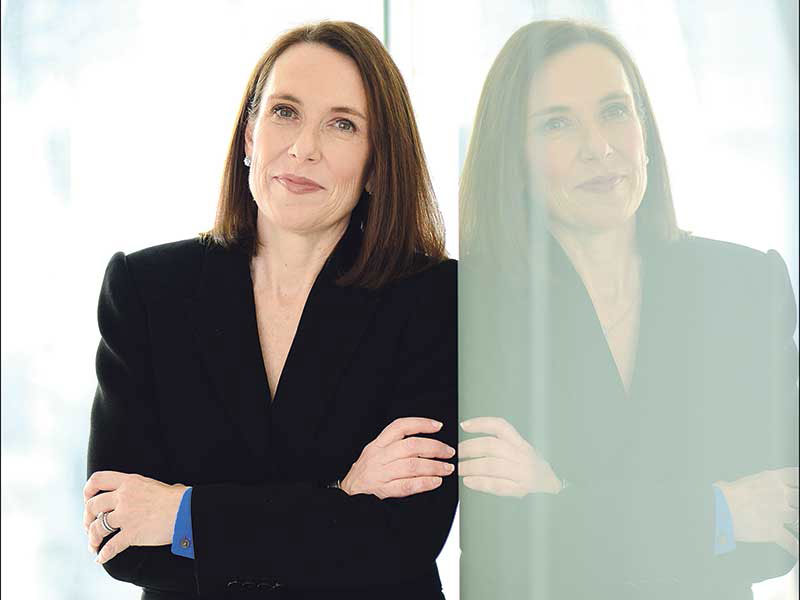
This article appears in the March 2022 issue of Investment Executive. Subscribe to the print edition, read the digital edition or read the articles online.
With ESG products rising in popularity, BlackRock Asset Management Canada Ltd.’s iShares Canada is positioning itself to capture the growing interest.
Leading the product manufacturer in that endeavour is Helen Hayes, who became managing director and head of Toronto-based iShares Canada in November. She spent the previous 11 years with CIBC Capital Markets in Toronto.
“We’ve seen a lot of growth in interest in sustainable investments,” Hayes said. “We see this shift persisting for years to come and becoming a principal contributor to the return of portfolios.”
Globally, New York-based BlackRock Inc. now manages US$509 billion in sustainable assets, “more than double from a year ago,” CEO Larry Fink said during the firm’s fourth-quarter earnings call. Sustainable AUM, therefore, accounts for about 5% of the manager’s US$10 trillion in overall AUM as of Dec. 31.
“Climate risk is investment risk,” Hayes said. “We expected two years ago that a tectonic shift toward sustainability would trigger a great repricing of assets across the board. This is why we incorporated climate change in our return and risk assumptions.”
BlackRock has been among the leaders in promoting stakeholder capitalism, the idea that companies perform better when they act in the interests of employees, customers and communities as well as their shareholders. In his annual letter to CEOs, Fink said his firm focuses on sustainability “not because we’re environmentalists, but because we are capitalists and fiduciaries to our clients.”
Hayes said investors have evolved from viewing ESG as a satellite strategy “to now viewing their whole portfolio through a sustainable lens.”
Sustainable investing can deliver strong investment returns. That was especially true early in the pandemic when tech stocks — which tend to feature heavily in sustainable funds — soared and energy stocks slumped amid sinking global demand for oil and gas.
Over the five-year period ended Dec. 31, 2021, 88 of the 110 Morningstar ESG indexes with five-year histories outperformed their non-ESG equivalents, according to an analysis from Dan Lefkovitz, strategist with Chicago-based Morningstar Indexes.
In January 2021, BlackRock committed to supporting the goal of net zero greenhouse gas emissions by 2050 or sooner.
“To understand the transition [to net zero] and the impact on portfolios, the industry needs to be able to measure and forecast it,” Hayes said. “Clients are setting specific objectives at a firm level — for example, contribution to net zero. Increasingly, we are seeing investors seeking sustainable strategies to mitigate exposures and to capture opportunities.”
One way BlackRock is looking to meet this need is through Aladdin Climate, a proprietary technology that lets investors calculate the climate risk in portfolios. Climate risk is presented alongside traditional financial metrics so investors can evaluate a security’s risks more broadly.
Additionally, last year the firm began publishing a metric from MSCI called “implied temperature rise” on the product pages for its index mutual fund and all ETFs. The metric incorporates current emissions intensity and expected emissions of the fund. (Other MSCI sustainability metrics were already being published on fund pages.)
BlackRock also has a proprietary framework to identify internally which companies are best prepared for a net zero economy.
Hayes entered the investment industry in an unconventional way. While working full time at Rogers Communications in the 1990s, she launched her own technology training consultancy. One of her clients, Bunting Warburg Inc., was bought out by investment bank UBS.
Due to her technology background, UBS offered Hayes a job as an equities specialist salesperson for the technology sector in 1998. She accepted, and shortly after she began her MBA at the Ivey Business School at Western University, taking classes part-time in the evenings.
She joined CIBC Capital Markets in 2009. The following year, she accepted an assignment in London, U.K., where she spent five years leading equity sales and trading in the region and assumed additional responsibilities for the firm’s Asia business.
Given that Hayes has moved a lot over the course of her career, her advice to women in the financial industry is to “be open-minded in your career” and “to take risks.”
“Since I started in the industry over 20 years ago, I have committed to take those risks, including moving my family and three children to London when my youngest was three years old. It was a fantastic experience for the whole family and one that opened up travel and global experience,” she said.
“If you are too rigid in your career planning, you may miss key opportunities to pivot and grow.”